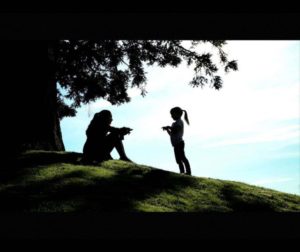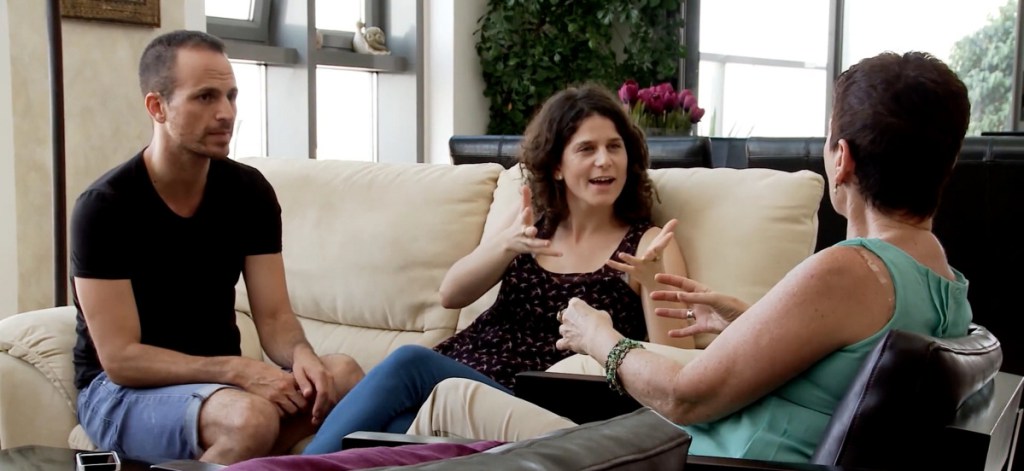Photo: A scene from Israeli film “Sign for Love,” which also played at the Maine Jewish Film Festival. Photos courtesy of the Maine Deaf Film Festival
Written by: Dennis Perkins
Posted: April 9, 2018
Maine Today
Begun in 2003 at the University of Southern Maine, the Maine Deaf Film Festival has grown from a simple one-day screening into a richly curated showcase of films both by and about the deaf community. The 16th annual Maine Deaf Film Festival takes place April 20 and 21, and features a truly eclectic mix of styles, genres, themes and countries of origin, with all of the films created either by, directed by or starring deaf people.
This year’s festival is coordinated by new USM linguistics department faculty member Sandra Wood. Via email, she answered questions about the festival, the films and how the obstacles deaf people have to face going to the movies.
Q: Could you describe your thoughts about what the overall mission of the Maine Deaf Film Festival is?
A: This is an event organized by the USM ASL (American Sign Language) Club and is the longest standing and only annual festival in the world to showcase the newest films and innovative videos by and for the deaf communities. Our mission is simple: provide a platform for people to learn about, appreciate and celebrate deaf culture, issues and art. All films are written, produced, created and performed by deaf and hard of hearing individuals and film production companies. Even though this is a USM student-organized event, it is produced in close collaboration with the local deaf community, many of whom serve on our committees and are actively involved in the organization, selection and activities of the festival. Our mission is deceptively simple, but our festival provides a showcase for deaf artistic endeavors in film that might not otherwise be featured and generate a buzz for them, allowing them to be recognized and disseminated more widely, nationally and internationally.
Q: For deaf viewers, what are the difficulties in enjoying movies?
A: Many of us in the deaf community really enjoy going to the movies, but often elect not to go, instead preferring to wait until they come out on DVD for one simple reason – captioning. Most of the local movie theaters in Maine do have “assistive” devices, i.e. personal closed-captioning equipment that consists of a small box with an LED screen attached to a long, slightly flexible coiled pole, which is inserted into the cup holder. It’s a very difficult experience to endure, as the coil is not always as flexible or stiff as we need it to be and changes position on its own, requiring constant adjustment during the movie. Many times, the captioning will disappear right in the middle of the movie or not even show up at all on the device. Needless to say, the movie-viewing experience by deaf people is not the same as enjoyed by their hearing friends or family who attend the movies with them. Some movie theaters will offer limited times showing one movie with open captioning, but our choices are limited to just that one movie, which we may or may not be interested in. This is one reason why the film festival is so important in our community, with films in signed languages and subtitles on the big screen, making them accessible to everyone attending.
Q: Can you give readers an overview of what sorts of films make up this year’s festival?
A: We will have 20 films, all either written, created, directed, or acted by deaf and hard of hearing actors. Recently, we started a new tradition of including student films made by our ASL students at the University of Southern Maine, and we are very pleased to have three excellent films that will be showcased at MDFF. There’s a unique genre of art in the deaf community which is called De’VIA – Deaf View in Art. In De’VIA, certain themes of resistance and affirmation are echoed through different motifs (symbols) that are prevalent in our literature and art. Since the theme of our festival is De’VIA in film, the students have created some amazing short films incorporating this theme in collaboration with deaf people in the local deaf community, featuring well-known local deaf people as actors or using their artwork as the basis for the film.
The films range from two hours to two minutes. There is a wide variety of genres as well – documentaries, horror, comedy, drama, LGBTQ, children’s film, international. We have nine films from other countries – Canada, the U.K., New Zealand, Poland and Israel to name a few – which means the signed language spoken in that film will be that country’s, not ASL, providing us with a truly global perspective. Some of them will have overt De’VIA themes and motifs. Others will be more general in their film style.

Q: There are also visiting speakers at this year’s festival.
A: We are pleased to have two guest speakers who will bring their expertise and insight in deaf art and film to our festival.
Patti Durr is an associate professor in RIT/NTID’s (Rochester Institute of Technology’s National Institute for the Deaf) Department of Cultural and Creative Studies and has won many awards for her filmmaking. Her keynote address will discuss the tradition and evolution of De’VIA art in deaf films.
Roxanne Baker is a well-known local deaf community member who is very actively involved in the arts, both locally and nationally. She recently gave an address at the 2018 Maine Jewish Film Festival in conjunction with an Israeli deaf film (“Sign for Love”), which will also be shown at our festival this year. A Portland native, Baker is a deaf Jewish alumnus of Governor Baxter School of the Deaf – now known as Maine Educational Center of the Deaf and Hard of Hearing (MECDHH/GBSD) – and currently an ASL instructor at USM. Roxanne is also an actress and member of the theater community.
Q: What films are you most excited for people to see at this year’s festival?
A: Three films this year are certain to engage and elicit a wide range of reactions: “The Silent Child” is a U.K. film with deaf actors, which won the best short live action film category at the Oscar awards. “Femme Sourdes, Dites-Moi (Deaf Women, Tell Me)” is a Canadian documentary written and directed by a deaf director about a deaf school for French deaf female students, which is unusual, since all other schools for the deaf tend to have both male and female students. Their stories are evocative and haunting. And “Sign for Love,” an Israeli film, which is a personal documentary by a gay deaf man who wants to become a father and does so with the help of his best friend. The film shows him on a personal journey reflecting on his fractured relationships with his family and his own personal growth.
This year’s 16th annual Maine Deaf Film Festival will take place on USM’s Portland campus on April 20 and 21 and offers Maine film fans a unique vision of an aspect of the filmmaking experience. For showtimes, films and ticket information, check out the festival’s website (mainedeaffilmfest.com) or its Facebook page (facebook.com/mainedeaffilmfestival).
Source: mainetoday.com/movies-and-film/indie-film/usms-maine-deaf-film-festival-still-one-kind/




